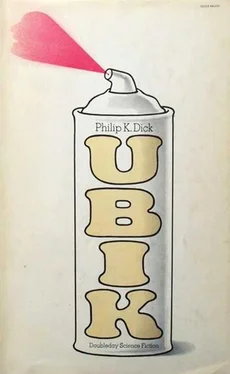“She goes back in time,” G. G. Ashwood said.
Joe stared at him.
“Back in time,” G. G. repeated, savoring this; his eyes shot shafts of significance to every part of Joe Chip’s kitchen. “The precog affected by her still sees one predominant future; like you said, the one luminous possibility. And he chooses it, and he’s right. But why is it right? Why is it luminous? Because this girl—” He shrugged in her direction. “Pat controls the future; that one luminous possibility is luminous because she’s gone into the past and changed it. By changing it she changes the present, which includes the precog; he’s affected without knowing it and his talent seems to work, whereas it really doesn’t. So that’s one advantage of her anti-talent over other anti-precog talents. The other—and greater—is that she can cancel out the precog’s decision after he’s made it. She can enter the situation later on, and this problem has always hung us up, as you know; if we didn’t get in there from the start we couldn’t do anything. In a way, we never could truly abort the precog ability as we’ve done with the others; right? Hasn’t that been a weak link in our services?” He eyed Joe Chip expectantly.
“Interesting,” Joe said presently.
“Hell—‘interesting’?” G. G. Ashwood thrashed about indignantly. “This is the greatest anti-talent to emerge thus far!”
In a low voice Pat said, “I don’t go back in time.” She raised her eyes, confronted Joe Chip half apologetically, half belligerently. “I do something, but Mr. Ashwood has built it up all out of proportion to reality.”
“I can read your mind,” G. G. said to her, looking a little nettled. “I know you can change the past; you’ve done it.”
Pat said, “I can change the past but I don’t go into the past; I don’t time-travel, as you want your tester to think.”
“How do you change the past?” Joe asked her.
“I think about it. One specific aspect of it, such as one incident, or something somebody said. Or a little thing that happened that I wish hadn’t happened. The first time I did this, as a child—”
“When she was six years old,” G. G. broke in, “living in Detroit, with her parents of course, she broke a ceramic antique statue that her father treasured.”
“Didn’t your father foresee it?” Joe asked her. “With his precog ability?”
“He foresaw it,” Pat answered, “and he punished me the week before I broke the statue. But he said it was inevitable; you know the precog talent: They can foresee but they can’t change anything. Then after the statue did break—after I broke it, I should say—I brooded about it, and I thought about that week before it broke when I didn’t get any dessert at dinner and had to go to bed at five P.M. I thought Christ —or whatever a kid says— isn’t there some way these unfortunate events can be averted? My father’s precog ability didn’t seem very spectacular to me, since he couldn’t alter events; I still feel that way, a sort of contempt. I spent a month trying to will the damn statue back into one piece; in my mind I kept going back to before it broke, imagining what it had looked like… which was awful. And then one morning when I got up—I even dreamed about it at night—there it stood. As it used to be.” Tensely, she leaned toward Joe Chip; she spoke in a sharp, determined voice. “But neither of my parents noticed anything. It seemed perfectly normal to them that the statue was in one piece; they thought it had always been in one piece, I was the only one who remembered.” She smiled, leaned back, took another of his cigarettes from the pack and lit up.
“I’ll go get my test equipment from the car,” Joe said, starting toward the door.
“Five cents, please,” the door said as he seized its knob.
“Pay the door,” Joe said to G. G. Ashwood.
When he had lugged his armload of testing apparatus from the car to his apt he told the firm’s scout to hit the road.
“What?” G. G. said, astounded. “But I found her; the bounty is mine. I spent almost ten days tracing the field to her; I—”
Joe said to him, “I can’t test her with your field present, as you well know. Talent and anti-talent fields deform each other; if they didn’t we wouldn’t be in this line of business.” He held out his hand as G. G. got grumpily to his feet. “And leave me a couple of nickels. So she and I can get out of here.”
“I have change,” Pat murmured. “In my purse.”
“You can measure the force she creates,” G. G. said, “by the loss within my field. I’ve seen you do it that way a hundred times.”
Joe said, briefly, “This is different.”
“I don’t have any more nickels,” G. G. said. “I can’t get out.”
Glancing at Joe, then at G. G., Pat said, “Have one of mine.” She tossed G. G. a coin, which he caught, an expression of bewilderment on his face. The bewilderment then, by degrees, changed to aggrieved sullenness.
“You sure shot me down,” he said as he deposited the nickel in the door’s slot. “Both of you,” he muttered as the door closed after him. “I discovered her. This is really a cutthroat business, when—” His voice faded out as the door clamped shut. There was, then, silence.
Presently Pat said, “When his enthusiasm goes, there isn’t much left of him.”
“He’s okay,” Joe said; he felt a usual feeling: guilt. But not very much. “Anyhow he did his part. Now—”
“Now it’s your turn,” Pat said. “So to speak. May I take off my boots?”
“Sure,” he said. He began to set up his test equipment, checking the drums, the power supply; he started trial motions of each needle, releasing specific surges and recording their effect.
“A shower?” she asked as she set her boots neatly out of the way.
“A quarter,” he murmured. “It costs a quarter.” He glanced up at her and saw that she had begun unbuttoning her blouse. “I don’t have a quarter,” he said.
“At the kibbutz,” Pat said, “everything is free.”
“Free!” He stared at her. “That’s not economically feasible. How can it operate on that basis? For more than a month?”
She continued unperturbedly unbuttoning her blouse. “Our salaries are paid in and we’re credited with having done our job. The aggregate of our earnings underwrites the kibbutz as a whole. Actually, the Topeka Kibbutz has shown a profit for several years; we, as a group, are putting in more than we’re taking out.” Having unbuttoned her blouse, she laid it over the back of her chair. Under the blue, coarse blouse she wore nothing, and he perceived her breasts: hard and high, held well by the accurate muscles of her shoulders.
“Are you sure you want to do that?” he said. “Take off your clothes, I mean?”
Pat said, “You don’t remember.”
“Remember what?”
“My not taking off my clothes. In another present. You didn’t like that very well, so I eradicated that; hence this.” She stood up lithely.
“What did I do,” he asked cautiously, “when you didn’t take off your clothes? Refuse to test you?”
“You mumbled something about Mr. Ashwood having overrated my anti-talent.”
Joe said, “I don’t work that way; I don’t do that.”
“Here.” Bending, her breasts wagging forward, she rummaged in the pocket of her blouse, brought forth a folded sheet of paper which she handed him. “From the previous present, the one I abolished.”
He read it, read his one-line evaluation at the end. “Anti-PSI field generated—inadequate. Below standard through-put. No value against precog ratings now in existence.” And then the codemark which he employed, a circle with a stroke dividing it. Do not hire , the symbol meant. And only he and Glen Runciter knew that. Not even their scouts knew the meaning of the symbol, so Ashwood could not have told her. Silently he returned the paper to her; she refolded it and returned it to her blouse pocket.
Читать дальше








